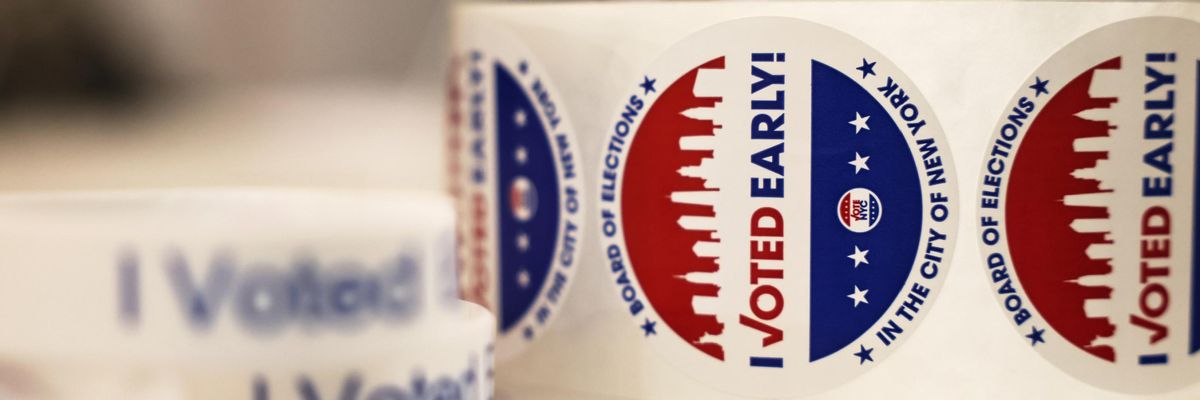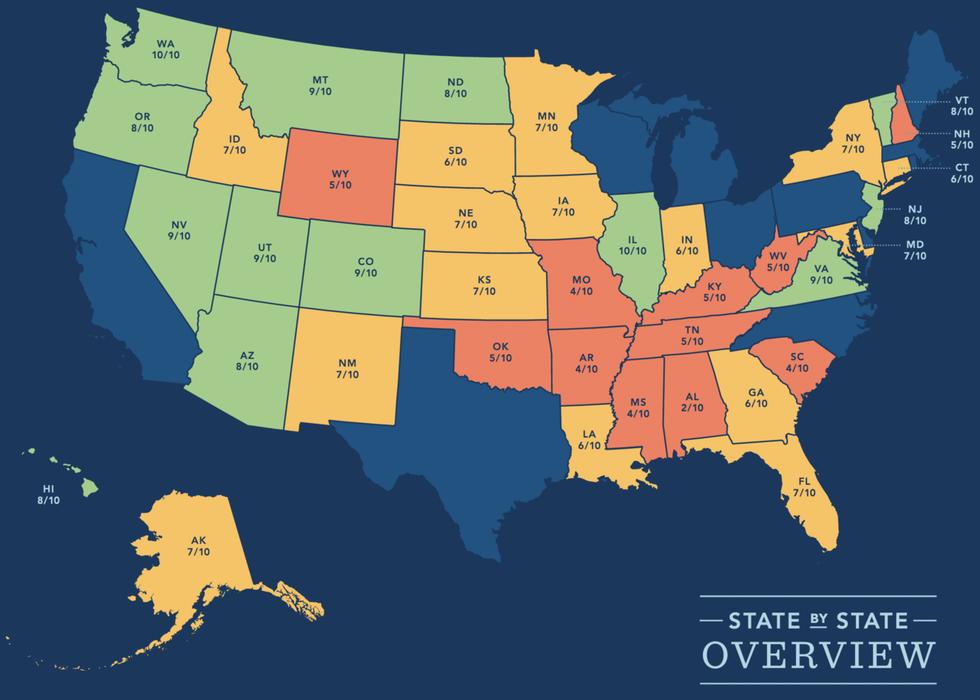As Texas Republicans sought the arrest of Democrats blocking voter suppression legislation and U.S. senators left Washington, D.C. without passing a major pro-democracy bill on Wednesday, a new state-by-state report detailed the GOP's ongoing assault on ballot access.
"Voting rights legislation must be passed urgently by Congress when they return from recess before more damage is done."
--Caleb Jackson, CLC
The Campaign Legal Center (CLC) released a scorecard (pdf) grading the 39 states whose legislative sessions ended on or before June 30, focusing on vote-by-mail and early voting laws.
The report also examines proposed federal legislation: the For the People Act--which the Senate GOP blocked again Wednesday--and the John Lewis Voting Rights Advancement Act.
"Federal intervention would have succeeded in preventing dozens of states from passing laws this year that severely curtail millions of Americans' freedom to vote," said Caleb Jackson, an attorney on CLC's voting rights team and co-author of the report. "Voting rights legislation must be passed urgently by Congress when they return from recess before more damage is done."
After Sen. Ted Cruz (R-Texas) blocked an attempt by Senate Majority Leader Chuck Schumer (D-N.Y.) to bring up the For the People Act for consideration on Wednesday, the Democrat vowed that voting rights legislation would be the top priority when senators return in September.
Meanwhile, many states have already enacted electoral laws this year that have both expanded and curtailed voting rights in the midst of the Covid-19 pandemic and following the 2020 presidential election--the results of which led former President Donald Trump and his GOP allies to spread lies about voter fraud and provoke the January 6 attack on the U.S. Capitol.
"The expansion of vote-by-mail and early voting opportunities were key to the 2020 election having the biggest election turnout in a century," said Jackson. "States should be working to expand these opportunities so that voter turnout can continue to improve. Our democracy works best when all voters are able to exercise the freedom to vote in safe and accessible elections."
CLC ranked states based on 10 factors, giving them a point for each:
- All voters can vote by mail;
- The state maintains a permanent mail voting list;
- Election officials can send voters unsolicited mail ballot applications;
- The state has a uniform mail ballot notice and cure process;
- The state does not require a state-issued driver license or ID to vote by mail;
- The state accepts mail ballots postmarked on or before Election Day and received up to 10 days after Election Day;
- The state offers at least two weeks of early in-person voting;
- The state offers online mail ballot tracking;
- The state offers ballot drop boxes; and
- The state allows voters to vote by mail without notary or enhanced witness requirements.
States with a score of eight or higher were labeled "green," meaning "least restrictive" in terms of vote-by-mail and early voting access. A score of six or seven earned a "yellow" label for "restrictive," and any state with five or fewer points was dubbed "red" for "most restrictive."
While none of the states received no points, only two--Illinois and Washington--got perfect scores.
The report highlights the impact of the pandemic, pointing out that "during the 2020 elections, 10 states changed their laws to allow all eligible voters to vote by mail either generally or because they feared contracting the coronavirus."
The group found that during the first half of 2021, "seven of the 39 states changed their vote-by-mail and early voting laws for the worse, while nine states changed their laws for the better."
Illinois, Kentucky, Maryland, New Jersey, New York, Oregon, Vermont, Virginia, and Utah improved their policies for mail-in and early voting, though the report notes that many "still fall short of the suggested best practices."
Alabama, Arizona, Arkansas, Florida, Georgia, Iowa, and Louisiana enacted restrictions. In all seven states, the legislatures are controlled by the GOP. All of their governors, other than Louisiana's, are also Republicans.
" With the exception of Maryland," the report notes, "the legislatures in states with the highest Black populations that changed their vote-by-mail and early voting policies each made changes for the worse: Alabama (27.5% Black), Georgia (33% Black), and Louisiana (33.4% Black)."
As for the potential impact of federal proposals, the report says:
At least four of the states that passed restrictive vote-by-mail and early voting laws in 2021-- Alabama, Georgia, Florida, and Louisiana--would have been subject to preclearance if the John Lewis Voting Rights Advancement Act was in effect. Preclearance would have required those four states to prove to the U.S. Department of Justice that their restrictive laws would not discriminate against voters of color. The report also explains how at least 37 of the 39 states analyzed currently have laws in place that would be preempted by S. 1, the For the People Act.
Though the scorecard covers much of the country, the report acknowledges that "several other states, including Texas, did not adjourn their legislative sessions by the year's halfway mark but plan to create deliberate barriers to vote by mail and early voting before the year ends."
Late Wednesday, after the Texas Supreme Court voided an order protecting quorum-breaking Democrats who fled to Washington, D.C. last month to stop GOP voter suppression legislation, state House Speaker Dade Phelan (R-21) signed civil arrest warrants for 52 of them.
Though CLC focused on vote-by-mail and early voting access, state lawmakers have also enacted other electoral reforms. According to the Brennan Center for Justice at the New York University School of Law, legislators in 49 states introduced more than 400 bills with voting restrictions during the 2021 legislative sessions.
While, as of July 14, at least 18 states had enacted 30 laws with such restrictions, the center's president, Michael Waldman, noted in a blog post last month that "25 states have enacted 54 laws that make it easier to vote."
The CLC report says that "every eligible voter deserves the freedom to vote in the safe and secure manner of their choosing. The few states that used their 2021 legislative sessions to make that happen should be applauded."
"As other state legislatures continue to work tirelessly to pass anti-voter laws," the report adds, "the federal government must work even harder to stop these nefarious efforts in their tracks."


